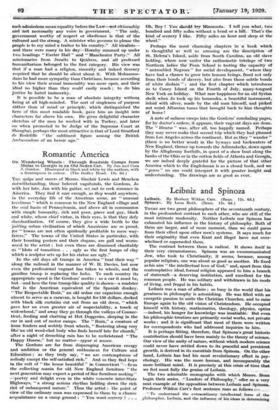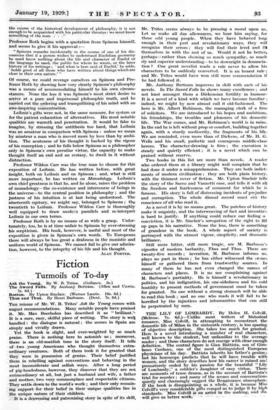Leibniz and Spinoza
Leibniz. By Herbert Wildon Carr. (Bann. • 12s. 6d.) THERE are two great philosophers of the seventeenth century, in the profoundest contrast to each other, who are still of the most intimate modernity. Neither Leibniz nor Spinoza has exhausted his influence in the history of philosophy. Both of them are larger, and of more moment, than we could guess from their effect upon other men's systems. It says much for their originality that even Kant and Hegel have not over- whelmed or superseded them.
The contrast between them is radical. It shows itself in their very circumstances. Spinoza was an excommunicated Jew, who took to Christianity, it seems, because, among popular religions, one was about as good as another. He fixed as his aim " the intellectual love of God," and, apart from this contemplative ideal, formal religion appeared to him a branch of statecraft—a deserving institution, and excellent for the common people. He was solitary and withdrawn in his mode of living, and frugal in his habits.
Leibniz was a man of affairs ; so busy in the world that his greatness in philosophy is astonishing. He was filled with an energetic passion to unite the Christian Churches, and to raise Europe again- to the old vision of Christendom. He occupied himself with history, mathematics, theology, physics, optics —indeed, his hunger for knowledge was insatiable. But even his philosophic treatises are primarily social works, not private works ; and it is significant that most of them were written for correspondents who had addressed inquiries to him.
It is perhaps fitting, therefore, that Spinoza's great historic contribution should have been mainly to the theory of science. Our view of the unity of nature, without- which modern science could never have settled down to its peaceful and persistent growth, is derived in its essentials from Spinoza. On the other hand, Leibniz has had his most revolutionary effect in psy- chology. His was the more human, and incomparably the more brilliant mind. It is precisely at this crisis of time that we feel most fully the genius of Leibniz.
The two admirable monographs with which Messrs. Benn begin their series, "Leaders of Philosophy," offer us a very neat example of the opposition between Leibniz and Spinoza. Professor Wildon Carr's first sentence runs as follows :— " To understand the extraordinary intellectual force of the _philosopher, Leibniz, and the influence of his ideas in determining the course of the historical development, of philosophy, it is not enough to be acquainted with his particular theories : we must know something of the man . . ."
Professor Roth begins with a quotation from Spinoza himself, and seems to give it his approval
" Spinoza remarks incidentally in the course of one of his dis- cussions that if a person wishes to understand Euclidian geometry he need know nothing about the life and character of huclid or the language he used, the public for whom he wrote, or the later
history of his writings; and what is here said of he adds, holds good of all those who have written about things which are clear in their own nature.' "
Of course, we could revenge ourselves on Spinoza and Pro- fessor Roth by showing how very clearly Spinoza's philosophy was a means of accommodating himself to his own circum- stances. None the less it was Spinoza's most strict desire to arrive at a pure and impersonal philosophic truth, and he carried out the ordering and tranquillizing of his mind with an awe-inspiring concentration.
Leibniz's gifts were not, in the same measure, for system or for the patient exhaustion of alternatives. His most notable qualities 'are warmth and penetration. It would be false to imagine, by stressing the antithesis too hard, that Leibniz was an amateur in comparison with Spinoza : unless we mean by amateur a man who is moved more by love than by ambi- tion. The acuteness of his thought is backed by the rigour of his conception ; and he falls below Spinoza as a philosopher only in Spinoza's own peculiar virtue, the capacity to make thought itself an end and an ecstasy, to dwell in it without distraction.
Professor Wildon Carr was the true man to choose for this exposition of Leibniz. He has written before, with great insight, both on Leibniz and on Spinoza ; and, what is still more important, he has written on Monadology. Leibniz's own chief greatness is that he, and he alone, raises the problem of monadology—the co-existence and intercourse of beings in the universe—to the central position in philosophy ; and the justness of his intuition is at last being understood. The nineteenth century, we might say, belonged to Spinoza ; the twentieth to Leibniz. Professor Wildon Carr is thoroughly well equipped to draw modem parallels and re-interpret Leibniz in our own terms.
Professor Roth is by no means of so wide a grasp. Unfor- tunately, too, he is at time unfair to Spinoza by over-stressing his scepticism. His book, however, is useful and most of the exposition is given in Spinoza's own words. To Europeans there will always be too great a drabness in the Monistic and uniform world of Spinoza. We cannot fail to give our admira- tion, however, to the integrity of his life and his thought.
ALAN PORTER.







































 Previous page
Previous page